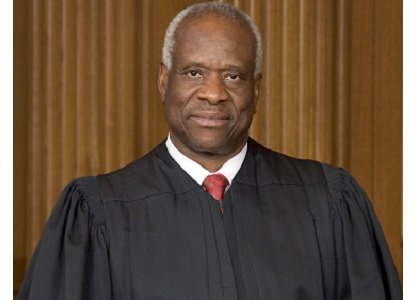(CNN) — For the first time in a decade, Supreme Court Justice Clarence Thomas spoke during oral arguments.
Just last week, CNN wrote about the ten-year anniversary of Thomas’s last question at oral arguments. That anniversary, February 22, came on the same day the Supreme Court first heard oral arguments after the death of Justice Antonin Scalia, who was Thomas’s ideological soul mate and who had defended his lack of questions over the years.
According to reporters in the courtroom Monday, Thomas asked a government attorney, Ilana H. Eisenstein, several questions during a case concerning gun ownership and domestic violence.
The question in the case that piqued Thomas’s interest Monday: Is a prior domestic assault conviction based upon reckless conduct a “misdemeanor Crime of Domestic Violence” for purposes of the federal firearms ban? The court is expected to release transcripts of the exchange Monday afternoon.
“Everyone leaned in disbelieving,” said Slate’s Dahlia Lithwick who was in the courtroom. “The colloquy went back and forth several times with Thomas pressing the Assistant Solicitor General,” Lithwick said. She said there was a tense moment when Thomas pushed Eisenstein to give another example where a misdemeanor conviction suspends a constitutional right.
Thomas has offered a variety of reasons for his silence from the bench.
“We have a lifetime to go back in chambers and to argue with each other,” Thomas said in 2013 according to the Associated Press. He noted that the lawyers only have about 30 minutes to present their side of the case. “They should argue. That’s a part of the process.” Thomas said and added that he doesn’t like to “badger people.”
“No one was more ideologically aligned with Justice Scalia than Justice Thomas, who has historically been reluctant to ask questions at oral argument because he believes his colleagues already do more than enough talking,” said Steve Vladeck, a law professor at American University and a CNN contributor. “That he’s now asking questions — for the first time in over a decade–is as powerful evidence of the impact of Justice Scalia’s absence as anything we’ve seen from the Justices thus far.”
Although Scalia and Thomas disagreed on some cases, they agreed on many and were close friends. Thomas was a lector at Scalia’s funeral and released a statement after his death saying “It is hard to imagine the Court without my friend. I will miss him beyond all measure.”
